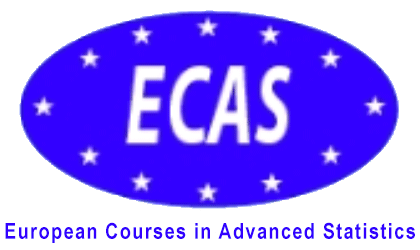The Constitution of European Courses in Advanced Statistics
Article 1. Name.Article 2. Objectives and Activities.
Article 3. Organization.
Article 4. Council.
Article 5. Executive Committee.
Article 6. Vacancies.
Article 7. Resignation.
Article 8. Amendments to the Constitution.
Annex. The current members of ECAS.
Article 1. Name.
The name of the association is ECAS (European Courses in Advanced Statistics). The abbreviation shall be ECAS in all languages.Article 2. Objectives and Activities.
- ECAS is a non-profit international scientific and educational organization.
- ECAS is a foundation of Statistical Societies within Europe in order to foster links
and to promote cooperation between statisticians in Europe by
- contributing to the development and improvement of the education for statisticians in Europe,
- promoting information concerning the field of, and persons interested in statistical education,
- improving communication and exchange among teachers, researchers and students in European countries,
- developing cooperation between Statistical Societies and establishments of higher education,
- stimulating networks of universities,
- contributing to the promotion and coordination of theoretical and applied research in statistics.
Article 3. Organization.
The business of ECAS shall be conducted by a Council and an Executive Committee.Article 4. Council.
- The Council is the legislative body of ECAS. It is responsible for the general policy and the main activities. It accepts applications of Members and elects the Executive Committee.
- The Council shall consist of one representative of each country for which at least one Society or statistical Group is a Member of ECAS.
- The ECAS Members of a given country elect, appoint or otherwise select their representative according to their own rules and according to their own agreement if there is more than one Member per country. The procedure shall be communicated to the Secretary of ECAS.
- Council members shall serve for a period of four years.
- Council members should meet biennially. The President or a majority of members can call a meeting at any time.
- Council votes can be performed during a Council meeting, or by mail vote. A motion is accepted if it obtains
- in a mail vote : the simple majority of all members of the Council.
- in a Council meeting : the simple majority of the Council members who are present and voting. If the latter condition is not fulfilled, any decision must be ratified by a mail vote.
For accepting a new Member of ECAS, a majority of two-thirds of the members of the Council is required.
Ties are broken by the vote of the President.
Article 5. Executive Committee.
- The members of the Executive Committee (general officers) are:
- the President
- the Vice-President
- the Secretary,and
- the Treasurer
- The President, in his absence the Vice-President, represents ECAS in its external relations and carries out the politics of ECAS according to the guidelines established by the Council, and implements its decisions and the general activities of ECAS. He is supported by the other members of the Executive Committee.
- The Secretary is responsible for the administrative business (including the organization of elections).
- The Treasurer is responsible for the financial management of ECAS. He shall submit
to all Members, at least every two years, a report on the financial conditions of
the organization including receipts and expenditures.
No part of net earnings or assets shall ever inure to the benefit of any privat individual. - The members of the Executive Committee are elected by the Council from among its members for a period of four years and cannot have more than two consecutive terms of the same office.
- The rules for the election of the President is the following: election as Vice-President for two years, as President for four years, and as Vice-President for two years.
Article 6. Vacancies.
In the event of any unscheduled resignation or death of a member of the Executive Committee or another member of the Council, the respective position shall be refilled according to the regulations in Article 5 and 6 for the period remaining to be served.Article 7. Resignation.
- Resignation of a Society or a Group is effected by a written declaration to the President.
- Membership can be terminated by a two-thirds majority vote of the Council if the conditions of membership are no longer fulfilled.
Article 8. Amendments to the Constitution.
Amendments to the Constitution of ECAS are possible with a majority of two-thirds of the members of the Council.Note: The previous statutes follow the amendments as voted in La Roche en Ardenne in September 2005, and by electronic voting in February-March 2013.
Annex.
The current list of all the member societies and their representative in ECAS are:Oesterreichische Statistische Gesellschaft ÖSG
Austria.
Representative: Andreas Futschik
Belgian Statistical Society SBS BVS
Belgium.
Representative: Thomas Verdebout
Croatian Statistical Association
Croatia.
Representative: Berislav Žmuk
Cyprus Statistical Society
Cyprus.
Representative: Andreas Anastasiou
Czech Statistical Society CStS
Czech.
Representative: Jan Picek
Dansk Selskab for Teoretisk Statistik (Danish Society for Theoretical Statistics)
Denmark.
Representative: Søren Højsgaard
Finnish Statistical Society FSS
Finland.
Representative: Pekka Pere
Société Française de Statistique
France.
Representative: Benjamin Guedj
Deutsche Statistische Gesellschaft DStatG
Germany.
Representative: Yarema Okhrin
Greek Statistical Institute
Greece.
Representative: Sotiris Bersimis
Hungarian Statistical Association HSA
Hungary.
Representative: Peter Kovacs
Società Italiana di Statistica SIS
Italy.
Representative: Stefania Mignani
Irish Statistical Association (ISA)
Ireland.
Representative: Simon Wilson
Association of Latvia’s Statisticians
Latvia.
Representative: Biruta Sloka
Luxembourg Statistical Society
Luxembourg.
Representative: Christophe Ley
Netherlands Society for Statistics and Operations Research VVS+OR
The Netherlands.
Representative: Casper Albers
Polskie Towarzystwo Statystyczne PTS
Poland.
Representative: Grazyna Trzpiot
Sociedade Portuguesa de Estatística SPE
Portugal.
Representative: Miguel De Carvalho
Romanian Statistical Society RSS
Romania.
Representative: Pele Daniel Traian
Slovak Statistical and Demographic Society SSDS
Slovakia.
Representative: Martin Boda
Statistical Society of Slovenia SSS
Slovenia.
Representative: Anja Znidarsic
Sociedad de Estadística e investigación Operativa SEIO
Spain.
Representative: Carmen Armero
Svenska statistikfrämjandet SS
Sweden.
Representative: Maria Karlsson
Swiss Statistical Society SSS
Switzerland.
Representative: Sylvain Sardy
Royal Statistical Society RSS
United Kingdom.
Representative: Chris Hallsworth
